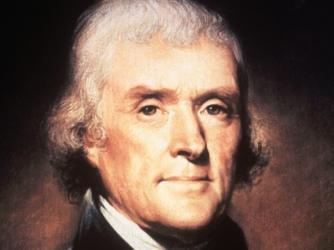"There is no question that those words are incompatible with slavery and he knew it," Pulitzer Prize-winning historian Joseph J. Ellis told Newsweek.
普利策奖获得者、历史学家约瑟夫J.埃利斯在接受《新闻周刊》采访时说:“毫无疑问,这些话与奴隶制是不相容的,他知道这一点。”。
"Washington is the only one of the Virginia aristocracy during the Revolutionary era to actually free his slaves. He freed them in his will," Ellis, who has written several books on the Founding Fathers including American Sphinx: The Character of Thomas Jefferson and His Excellency: George Washington, said.
埃利斯表示,“华盛顿是革命时代弗吉尼亚贵族中唯一一个真正释放奴隶的。他在自己的遗嘱中释放了他们,”他写了几本关于开国元勋的书,其中包括《美国的斯芬克斯:托马斯·杰斐逊的性格》和《华盛顿传》。
"Jefferson is complicated because he straddles the racial divide. He was a slaveowner in Monticello, he never freed his slaves, but he was also the author of those magic words of American history.
“杰斐逊是个复杂的人,是因为他跨越了种族鸿沟。他是蒙蒂塞洛的奴隶主,他从未释放过他的奴隶,但他也是美国历史上那些神奇词汇的作者。
"He straddles the racial divide in a way that nobody else does because he is spokesman for the values that are central to the liberal tradition in American history but also he believed black people are inferior and they can never become equal."
“他跨越种族鸿沟的方式无人能及,因为他是美国历史上自由传统核心价值观的代言人,但他也相信(黑人)是低人一等的,他们永远不可能平等。”

Jefferson publicly opposed slavery—referring to it as a "moral depravity" and a "hideous blot"— yet over the course of his life, he enslaved more than 600 people, according to the Thomas Jefferson Foundation.
杰斐逊公开反对奴隶制,称之为“道德败坏”和“可怕的污点”,然而根据托马斯·杰斐逊基金会的说法,在他的一生中,他奴役了600多人。
He also embraced eugenics, writing about how he believed black people to be inferior to white people in Notes on the State of Virginia. Jefferson told a friend, a French duke, in a letter that he believed the only way slaves could be emancipated is if it was done "all at once" and they were then all expelled to a far off land.
他还信奉人种改良学,他在《弗吉尼亚州笔记》中写道,他认为黑人劣于白人。杰斐逊在给自己的一位法国公爵的朋友的信中写道,他相信解放奴隶的唯一途径是立刻完成,然后把他们驱逐到一个遥远的地方。
That view, the duke wrote, was based on Jefferson's conviction of the "certain danger" of "seeing blood mixed without means of preventing it."
那名公爵写道,这个观点是基于杰斐逊对“看到混血而无法阻止的”的“某种危险的”看法。
Yet Jefferson also fathered several children with one of his slaves—a mixed-race woman named Sally Hemings—and those children were also his property.
然而杰斐逊也和自己的一个叫萨利·海明斯的混血妇女的奴隶生了几个孩子,这些孩子也是他的财产。
Hemings became "Mr. Jefferson's concubine," according to her son Madison, when she accompanied the family on a trip to France in the 1780s. While pregnant at 16, she refused to return to America, and only did so after negotiating freedom for her future children.
据海明斯的儿子麦迪逊说,她在18世纪80年代陪同杰斐逊一家去法国旅行时,成了“杰斐逊的小妾”。她16岁怀孕时,拒绝返回美国,她这样做只是在为未来的孩子争取自由。
译文由可可原创,仅供学习交流使用,未经许可请勿转载。












